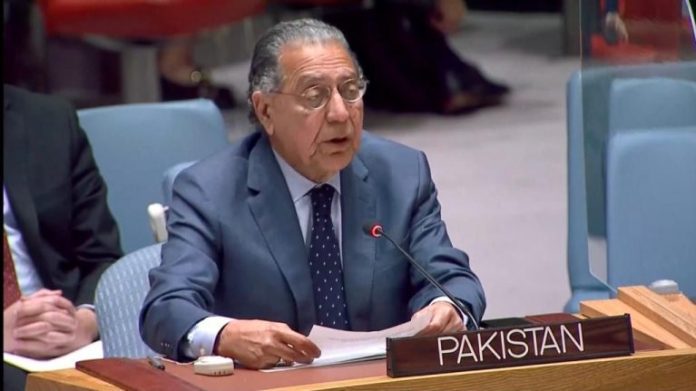Ambassador Munir Akram asserts that normalization in Afghanistan cannot occur until core issues such as terrorism, human rights violations, political inclusion, and the plight of refugees are adequately addressed

UNITED NATIONS: During a recent debate at the United Nations Security Council, Pakistan’s Ambassador Munir Akram raised alarms regarding the Tehrik-e-Taliban (TTP), highlighting its growing role as an umbrella organization for various terrorist groups under the protection of the Afghan authorities. He cautioned that the TTP poses a significant threat not only to Pakistan but also to Afghanistan’s neighboring countries.
“While some may focus solely on the threat posed by Daesh, they should also be wary of the emerging danger from a bolstered TTP in the near future,” Ambassador Akram stated, emphasizing the urgent need for collective action against this group. The TTP, referred to in Pakistan as Fitna Al Khawarij, has been responsible for numerous cross-border attacks, leading to the deaths of hundreds of civilians and military personnel. Ambassador Akram outlined the dire security situation that persists in Afghanistan even three years after the Taliban regained control. He asserted that normalization in Afghanistan cannot occur until core issues such as terrorism, human rights violations, political inclusion, and the plight of refugees are adequately addressed.
“Terrorism from Afghanistan represents the single most serious threat to regional and global security,” he said, referencing a recent UN report that identified the TTP as the largest terrorist organization in the country. The report also noted that the group receives increasing support from the Taliban to conduct attacks across the border into Pakistan.
Despite the Afghan Interim Government (AIG) combatting ISIL-K (Daesh), other terrorist organizations, including Al-Qaeda and the TTP, continue to operate with relative impunity, benefiting from safe havens in Afghanistan. Ambassador Akram reiterated Pakistan’s commitment to fostering a stable and peaceful Afghanistan, aligning with the aspirations of its neighbors and the international community for greater political inclusivity.
However, he expressed serious concern regarding the AIG’s ongoing human rights violations, particularly against women and girls. “The AIG has failed to uphold its commitments regarding women’s rights, implementing new directives that silence their voices,” he stated, condemning these actions as contrary to the principles of equality enshrined in Islam.
Ambassador Akram emphasized that while Pakistan seeks constructive engagement with the Taliban, the regime must not be permitted to manipulate regional dynamics to evade its responsibilities. He also addressed the humanitarian crisis in Afghanistan, where 23.7 million people urgently require assistance. He called on the international community to provide aid unconditionally, noting that the Afghanistan Humanitarian Needs and Response Plan has secured less than 25% of its $3.06 billion funding goal.
“Immediate action is required to fully fund this plan,” he urged, highlighting the necessity of mobilizing all available resources to alleviate the suffering of the Afghan people.
In addition to humanitarian efforts, the ambassador reaffirmed Pakistan’s support for Afghanistan’s economic revival. He stressed the importance of reviving the Afghan banking system, resolving liquidity issues, and unfreezing the country’s national reserves. “Pakistan is committed to enhancing trade and commercial relations with Afghanistan and remains a key partner in regional infrastructure projects,” he added. Ambassador Akram concluded by urging the AIG to fulfill its international obligations, warning that policies leading to instability cannot continue without consequences.
#TTPThreat, #UNSecurityCouncil, #Pakistan, #Afghanistan, #AmbassadorMunirAkram, #Terrorism, #HumanRights, #RegionalSecurity, #Normalization, #HumanitarianCrisis, #WomenRights, #AlQaeda, #EconomicRevival, #AfghanBanking, #AidFunding, #PoliticalInclusion, #CollectiveAction, #RegionalDynamics, #InternationalCommunity, #RefugeePlight



